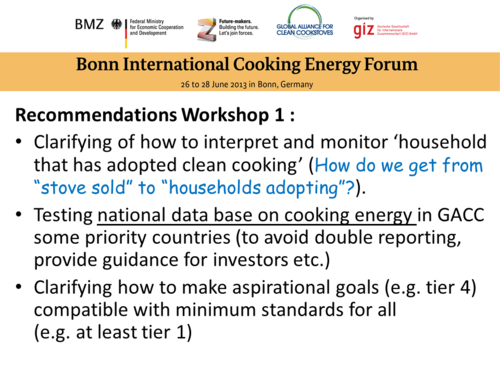How Can We Contribute to Measure the "100 Million by 2020" Goal? - Workshop 1 Recommendations Bonn 2013
From energypedia
The printable version is no longer supported and may have rendering errors. Please update your browser bookmarks and please use the default browser print function instead.
| ► Back to Forum Overview | ► Back To Thursday, 27 June 2013 |
Workshop 1: How Can We Contribute to Measure the "100 Million by 2020" Goal?
This workshop focused on the achievements to date and the contributions to the Global Alliances's overarching goal of 100 million homes adopting clean and efficient stoves and fuels by 2020. Furthermore, monitoring approaches of different cooking energy interventions at global, international and national level were presented, and options for harmonizing monitoring interests and methods were discussed. Participants also analyzed and discussed the current supply of and demand for information for reporting on the objective of '100 million by 2020' and elaborated on possible achievements.
| ► | Facilitator/Chair: Dr. Christoph Messinger, GIZ/EnDev |
| ► | Rapporteur: Dr. Anne Wheldon, Ashden |
Objectives
- Understanding the Alliance's target and the information to monitor progress
- Understanding different monitoring needs, systems and challenges of selected partners (European practitioners, national governments using the example of Kenya)
- Elaborating recommendations for national governments, donors, the Global Alliance's secretariat and partner on monitoring the overall target
Presentations
| ► | How Can We Contribute to Measure the "100 million by 2020" Goal? - Leslie Cordes, Global Alliance for Clean Cookstoves |
| ► | Dr. Carsten Hellpap, Energising Development, GIZ |
| ► | Michael Kelly, World LP Gas Association |
| ► | Peter Odhengo, Office of the Deputy President, Kenya |
| ► | Dr. Venkata Ramana Putti, World Bank - Measuring Access |
Key Areas Discussed
- We discussed the interpretation of the GACC aspirational goal of 100 million households, and SE4All goal of universal energy access, including whether the two goals are compatible, and how they link to national targets and plans.
- We looked at the detail of data to be collected and some of the difficulties in this, in particular how to go from stoves sold -> households with access to clean cooking -> households adopting clean cooking.
- We heard the experiences of three GACC members (EnDev, WLPGA, Government of Kenya) with monitoring their work, and discussed challenges, good examples and different ways in which monitoring could be harmonized to meet GACC needs.
Recommendations
- Establishment of national data bases on cooking energy. These would be useful to avoid double counting of stoves, for investors and stove programs, and also for other government activities as well as stoves. However, there is no general recommendation about what organization should host such a data base or who is responsible for data collection.
- A generally accepted interpretation is needed of the meaning of ‘household that has adopted clean cooking’, along with guidance on how this should be monitored.
- As far as possible, the existing monitoring structures of stakeholders in the stove sector should be used for GACC reporting.
Specific Action Proposed (Including Responsibilities)
- National cooking data bases should be piloted in some of the priority countries of GACC or World Bank/ESMAP
- The GACC secretariat and members should work jointly to agree the interpretation of ‘household that has adopted clean cooking’, and to produce guidance on monitoring.
- The GACC secretariat and members should work jointly to review existing monitoring structures, and develop a document or toolkit that identifies gaps in current reporting and explains what is needed to make reporting comprehensive.




















